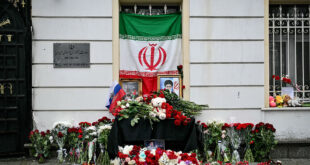BEIT IBA, West Bank (AP) Tony Blair toured a Palestinian aluminum factory Thursday and was told it runs at one-third capacity because of Israeli import restrictions. He promised he’ll take it up with Israeli authorities.
It’s a typical encounter in the Mideast envoy’s yearlong push to boost the West Bank economy.
In an interview summing up his efforts, Blair said he’d like to see much quicker progress toward freedom of movement for Palestinians. Israeli roadblocks and obstacles, set up after the outbreak of the second Palestinian uprising against Israeli occupation in 2000, keep disrupting life and trade.
After years of downward spiral, the situation “stopped going down in the West Bank, it started to go back up again, but not nearly fast enough,” the former British prime minister told The Associated Press.
Despite the slow pace, Blair said he’ll stick with the assignment and keep slogging through the mundane details of the conflict, such as negotiating with Israel over the fate of individual checkpoints.
“For me, I’m content to work on it as long as I can and as long as I’m useful,” he said, sitting in an office in the aluminum factory, NAPCO, in the village of Beit Iba, just outside the West Bank city of Nablus.
Blair became envoy of the Quartet of Mideast mediators — the United States, the United Nations, the European Union and Russia — in June 2007, but was given only a limited assignment. He was asked to prepare the ground for a Palestinian state by encouraging reform, economic development and institution-building, while Israeli-Palestinian peace talks remained under Washington’s sole purview. Peace talks resumed in November but have made no apparent progress.
Perhaps his biggest achievement was a conference in which donor countries promised $7.7 billion in aid to the Palestinians over three years. The idea was that Palestinians would gradually become less dependent on aid, as the private sector drove an economic recovery.
However, the World Bank said in a report in April that the Palestinian economy won’t grow this year, largely due to Israeli movement restrictions.
Nablus, once the West Bank’s commercial center and during the uprising a militant stronghold, remains hard hit by travel restrictions. Roadblocks ring the city, and only one access road is open to motorists. At Nablus’ southern entrance, the Hawara checkpoint is a major bottleneck, especially during rush hour when thousands cross on foot. Waiting times can range from a few minutes to an hour.
The Israeli military said it’s sprucing up Hawara to ease the flow, but would not give details. One of the Nablus checkpoints was removed several months ago, opening access to parts of the northern West Bank.
During Thursday’s visit to Nablus, Blair met with Palestinian business leaders, who announced the city would host an investment conference in October.
Monib al-Masri, one of the West Bank’s wealthiest men, said the group hopes to draw 200 to 300 investors, but added that removing checkpoints is vital.
“I told Mr. Blair today that nobody will come here if Hawara and other checkpoints are there,” he said.
Blair said he’s pushing to get checkpoints removed, but that it requires patience. Israel has genuine security concerns, he said, and more time is needed to rebuild trust destroyed during years of violence.
“What we are saying is that in time they (checkpoints) have got to be removed, but in the meantime, for goodness’ sake, make them work effectively,” he said.
Blair met Tuesday with Israeli Defense Minister Ehud Barak, who said that while Israel is working to improve life in the West Bank, its main commitment is to the security of Israeli citizens. Israel says checkpoints are key to preventing attacks by Palestinian militants who killed hundreds of Israelis in bombings and shootings during the uprising.
Naim Aker, who sells bathroom tiles in Nablus, said he’s running out of time. Sales are down and transportation costs up because of the checkpoints, he said, adding that he’s been dipping into his savings and plans to move to the Gulf if the situation does not improve within a year.
The aluminum factory in Beit Iba, which employs 140 people, has been operating at 27 percent capacity, mainly because Israel banned the import of a key ingredient, sulfuric acid, said technical manager Jamal Daraghmeh. The factory needs the chemical, which can also be used in bombs, for most of its products.
Blair said the factory could employ another 100 people if it got the necessary raw materials. He also pointed out the bumpy access road to the plant, noting that Israel has not granted permission to pave it. The envoy said he’d raise both issues with the Israeli authorities.
Blair said he remains motivated to help resolve the Mideast conflict, despite slow progress.
“I think it is … the single most fundamental issue for us to resolve, in terms of peaceful coexistence, not just between Israelis and Palestinians, but between the West and Islam, the world and Islam,” he said.
 Eurasia Press & News
Eurasia Press & News



